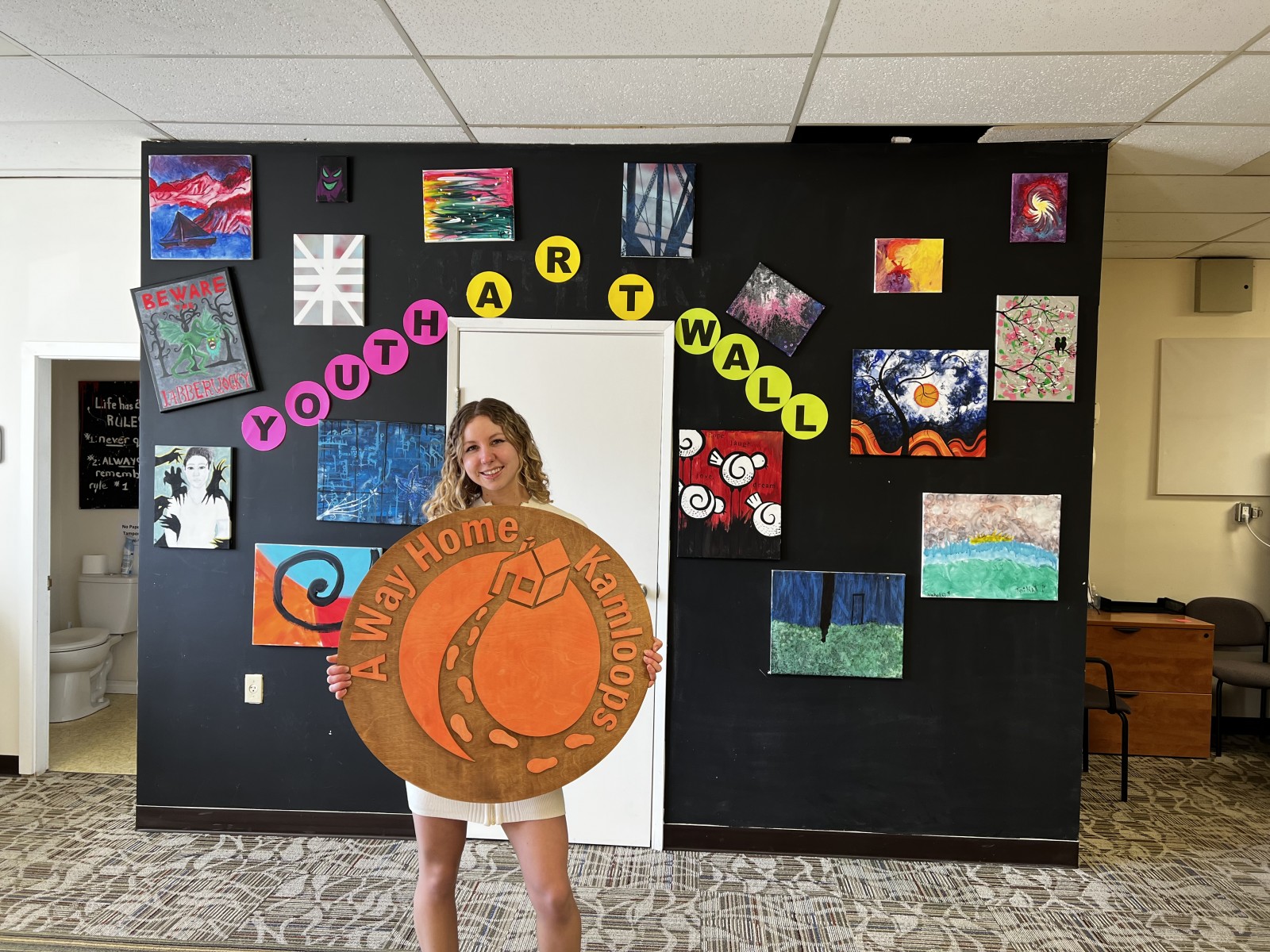Building strength, safe spaces and purpose for youth in Kamloops

Dayna, case worker at the A Way Home Kamloops office.
For Homelessness Action Week (Oct. 9-16, 2022), we’re highlighting stories about the pathways in and out of homelessness. There are as many ways to become homeless as there are people without a home. Follow us this week on our social media channels and find out more about the many paths to tackling homelessness and housing affordability.
Dayna knows how important safe shelter is for young people living on the street. As a former youth in care, she’s experienced trauma, homelessness and the impacts of substance use. Living in an unsafe placement at 15, the street was her escape, a common pathway for youth in care. At 17, she needed a change. “It was my graduation year: all my friends were buying their grad dresses and I was homeless,” Dayna said. “I had literally just come off the streets, I was two weeks clean off drugs and I was like, I’m going to go back to school.”
Dayna was placed with a new foster care family, finished high school, and ultimately, she got a degree at Thompson Rivers University. Today Dayna works with A Way Home Kamloops (AWHK) – a non-profit supporting youth experiencing or at risk of experiencing homelessness. The organization was founded in 2012 by Katherine McParland, a tireless youth advocate who led AWHK until her passing in 2020.
Dayna does weekly check-ins with youth in independent housing, ensuring they’re on track with their wellness. In addition to learning daily skills like cooking and cleaning, clients get help to reach their financial literacy, employment and education goals. Most importantly, Dayna provides consistent support, something she wishes she had while in care.
Roughly half of those supported by AWHK are 2SLGBTQIA+ youth. Providing support means listening deeply to their needs and goals. “We work with quite a few youth who are transitioning,” says AWHK Executive Director Tangie Genshorek. Staff and peers provide more than unconditional acceptance. Clients receive assistance and referrals for health supports, detox and harm reduction, financial guidance, mental health and anything they might need. "We helped a couple youth with their name changes last year,” says Tangie. “It’s exciting.”
Indigenous youth are also a significant part of the people AWHK supports. This over-representation really struck a chord with Dayna. Her practicum with AWHK program partner Kamloops Aboriginal Friendship Society gave her a special understanding for the cultural needs of clients: “Especially with the history in Kamloops, with the residential school here and so many Survivors...there’s so many who need supports.” Dayna and the team at AWHK work with partners like the Friendship Society.
For AWHK, building trust is crucial when working with youth, many of whom have experienced trauma and lost trust in others. "It’s the most important thing,” says Tangie. “They have a whole bunch of reasons not to trust. And they’re fleeing someone they don’t trust.” Building these new relationships means having empathy and an acceptance of each person, wherever they are in their journey. "You believe that they can be successful, valuable people, no matter what they are or what they do. That means being able to provide them options, whoever they are, whenever they’re ready.”
The next step for AWHK is to build a specialized shelter for young people, called Katherine’s Place, named after Katherine McParland. The building will provide 39 supportive homes for youth experiencing homelessness. Client voices drive programming. They’re “sharing what they think would be helpful for supporting them in their housing: obtaining it, maintaining it, and transitioning to independence,” says Dayna.
“This is Katherine’s dream,” says Tangie. “She had a vision of a place where youth are safe, it’s appropriate for them and all of the community supports that are needed can be wrapped around in that location. We can’t build programming without their voices. They’re the ones we’re serving. They’re the ones who know what they need.”
Katherine’s Place is made possible by funding from the Province through BC Housing and is expected to open late 2023. “We’re really excited about the partnership with BC Housing because they really understand Katherine’s vision and the importance of this,” says Tangie. “We feel really supported by the BC Housing team to realize this vision. I’m really excited and I am optimistic for sure.”
Dayna shares Tangie’s optimism. “Before, I used to always question: Why don’t I have family? Why am I in foster care? Why am I homeless on the streets? Why is all this happening to me?”
Her experiences and work with youth have reframed her outlook on life. “It’s something that Katherine said to me: ‘Sometimes our most horrific events that cause the deepest wounds can become our life’s greatest purpose.’ As I’ve gotten older, I’ve really realized that’s so true. I’m actually helping people live the experience I’ve had and hopefully make long term change for them.”
To learn more about the work of A Way Home Kamloops, visit www.awayhomekamloops.com.
Since 2017, BC Housing has approximately 36,000 homes complete or underway across the province. We're rapidly working to boost the supply of affordable housing across B.C.
To find resources for 2SLGBTQIA++ youth, visit www.qchat.ca/bc-lgbtq2s-resources. To learn more about Housing Assistance through BC Housing, visit https://www.bchousing.org/housing-assistance or contact our Applicant Services line at 604-433-2218 or 1-800-257-7756 (toll free).
A new rent supplement is now available for youth from care, offered by the Ministry of Children and Family Development. Recipients can receive $600-a-month for two years or until their 27th birthday. First round applications are open until November 1, 2022. To learn more, visit news.gov.bc.ca/releases/2022CFD0024-001553

